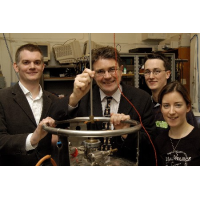MP visits University in science pairing scheme

Hilton Dawson, MP for Lancaster and Wyre, has visited one of the coldest places in the universe at Lancaster University’s Ultralow Temperature Group.
He spent the day at Lancaster University on January 14 as part of a Royal Society scheme that pairs scientists with politicians.
The MP, who was the guest of Physics Research Fellow Dr Richard Haley, spent the day visiting a number of research groups and taking part in some hands-on experiments in the Physics Department - one of only five 5 star research rated departments in the UK.
Dr Haley works in the internationally-renowned Ultralow Temperature Physics Group, whose work concerns the behaviour of materials at the lowest accessible temperatures – to within a few millionths of a degree above absolute zero. Lancaster has one of the leading low temperature laboratories in the world and has twice gained the lowest temperature ever reached.
Hilton Dawson said he had been impressed by the diverse range of research and expertise in the University ranging from cancer research to global warming.
He said: “This has been a fantastic opportunity. It has been absolutely mind-boggling talking to people who are exploring the fundamental particles that make up the world around us. Scientists at Lancaster are looking at the origins of the universe and pushing back the boundaries of science. This is a really rich resource for science here in Lancaster – pure science with practical spin offs that have the potential to affect our lives in the future.”
The visit followed Dr Haley’s five-day visit to the House of Commons in October when he shadowed Mr Dawson and attended seminars and meetings, including the Parliamentary Science and Technology Committee.
The week was aimed at giving him a ‘behind the scenes’ insight into how science policy is formed and an understanding of the working life of an MP. Dr Haley will also spend a day with Mr Dawson in his constituency on January 21.
Dr Haley, a Royal Society University Research Fellow, said: “The week I spent in Westminster was a fantastic experience, and gave me a great insight into the workings of government and the hectic daily schedule of a busy MP. The pairing scheme fosters direct links between scientists and MPs, hopefully enabling them to become better informed on science issues which affect all of us..”
The MP-Science Pairing Scheme was launched in 2001 by the Royal Society – the UK national academy of science - with the aim of building bridges between some of the best research workers in the country and members of the UK Parliament. Over 40 pairs of scientists and MPs have taken part in the scheme already.
It’s the second time Hilton Dawson has taken part in the scheme – two years ago he teamed up with a member of staff from the Biological Sciences Department.
Dr Haley recently received a commendation prize at Science in September – a showcase of the best scientific research in the UK, held at the House of Commons and organised by SET (Science, Engineering and Technology) for Britain.